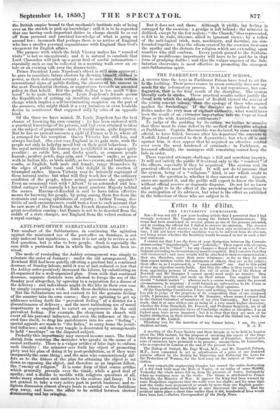Trttrr to 4t attar.
THE 'UNIVERSITY COMMISSION.
SM—It was not till I saw your leading article that I perceived that I hail wrongly reckoned Mr. Vaughan among the Oxford Commissioners. His name had been mentioned in several places as one of the persons intended, and in reading the official list I failed to observe its omission. The absence of Mr. Stanley's I did observe; but as he had been only mentioned as Secre- tary, I did not know whether anything was to be inferred from its absence, not being aware whether the Secretary would be named or not in such a for- mal statement.
I cannot say that I see the force of your distinction between the Commis- sioners acting "inquisitorially " and judicially." Their report will, of course, as you say, not be "final" ; for any changes a Royal order or an act of Par- liament (according to circumstances) must be required. lint I conceive that they will recommend ; and some weight will be attached to their recommendation ; they are, therefore, more than mere witnesses; so far as they do more than report totidem verbis the statements of others, they are so far judges; their office is, as I expressed it, a "quasi-judicial" one. And in this point of view my. objection surely holds. And that the Office is thus meant is clear from appointing persons of whom five out of seven (for of the Bishop of Norwich and Mr. Dampier I cannot speak) need make no inquiry : they have already inquired, and made up their minds. You suggest that we should "furnish matter " ; whereas such a course would, under the present circumstances, be nugatory : I could furnish no information to Dr. Jeune or Mr. Johnson; I could only attempt to change their opinions. Of the Cambridge Commission I have said nothing, because I am naturally less able to judge of the propriety of its composition than of one composed (with, I presume, the exception of Mr. Dampier, whose name I cannot find in the Oxford Calendar) of members of my own Univensity. But I may re- mark, that it at once strikes one as being of a very much higher character ; whether Sir john Bersehell, 1)r. Peacock, and Professor Sedgwiek, are at all committed to any particular views of Cambridge studies or discipline, I as an Oxford man have never inquired ;but but it is clear that they are men of far higher distinction in their several Imes than any of the Oxford list, with the exception of Mr. Liddell.
Thanking you for the insertion of my former letter, I am Sir, your


























 Previous page
Previous page